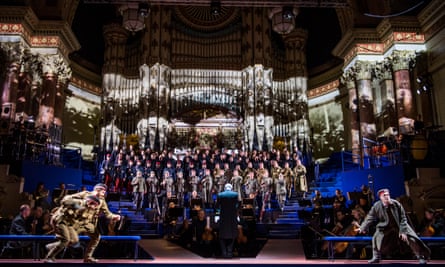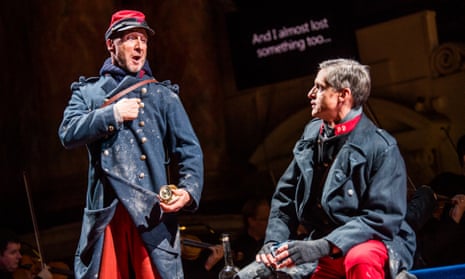Of course it was never going to be all over by Christmas. But the spontaneous truces that occurred along the western front on 24 and 25 December 1914 have become part of first world war mythology, enshrined in everything from Oh! What a Lovely War, Paul McCartney videos and Blackadder Goes Forth to the 2005 film Joyeux Noël, on which this opera by the US composer Kevin Puts is based.
Puts’s debut stage work, originally commissioned by Minnesota Opera in 2011, won the Pulitzer prize for music and has been widely produced across the United States. Though it was staged at the Wexford opera festival, these performances by Opera North mark the UK premiere. Within the Victorian opulence of Leeds Town Hall, Tim Albery’s production has the feel of an epic Christmas oratorio rather than an opera per se. But the waves of sound generated by the massed ranks of an immense male voice choir (the Opera North chorus reinforced by students from the Royal Northern College of Music and a battalion of community singers) creates an overwhelmingly emotive experience.

Puts and his librettist Mark Campbell focus on a fictionalised version of a true event, in which the German crown prince sent a leading tenor from the Imperial Opera to sing at the front. Romanticising things somewhat, he is also reunited with his leading lady, with whom he concludes the command performance by making a rather fanciful bid for freedom across no man’s land. But it does enable Puts to include some telling pastiche of rococo court opera conventions, in which armed conflict is presented as a harmless, shiny-buttoned lark.
The German narrative is juxtaposed with that of a Glaswegian fusilier grieving for his dead brother, who ultimately brings the seasonal ceasefire to an end. Alongside the Scottish trenches is a French unit who complain, amid the temporary cessation of mortar fire, that nothing is more distressing than the perpetual wail of bagpipes. It is to Puts’s credit that the lone piper ultimately delivers an incredibly plangent motif as the combatants use the last hours of the truce to bury their dead. And the score’s most affecting moment is a tranquil chorus that takes full advantage of music’s power to harmonise chaos, in which French, German and Scottish soldiers all yearn for the temporary oblivion of sleep in three languages at the same time.
The limited space for scenic elements means that the action is fairly static, though video designers Matt and Rob Vale animate the platform with archive footage from the front, creating a spectral kaleidoscope of doomed soldiers careering over the top of the town hall organ. Conductor Nicholas Kok commands an impressive range of colours – it is not every day a harmonica player receives an orchestral call-up – and the vocal performances are of a high standard throughout. Rupert Charlesworth impresses as the German tenor with Máire Flavin making the most of his slightly histrionic girlfriend. Quirijn de Lang gives a touching portrayal of a French lieutenant separated from his pregnant wife, though the most poignant performance comes from Geoffrey Dolton as a faithful private, shot by mistake having exchanged uniforms in no man’s land.

Comments (…)
Sign in or create your Guardian account to join the discussion